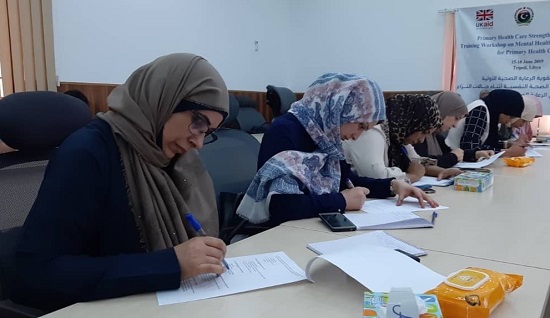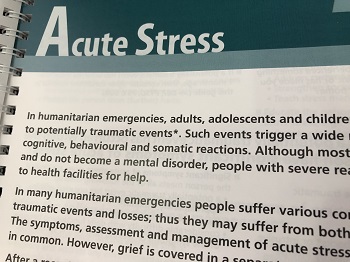 Dr Najia Abdullah, left, participates in exercises as part of a workshop in identifying and treating mental illness
Dr Najia Abdullah, left, participates in exercises as part of a workshop in identifying and treating mental illness
Two months after an armed conflict began in Libya’s capital in April 2019, nearly 100 000 people had fled their homes to escape bombings and airstrikes. Many are living with relatives. The recent conflict has compounded the difficulties and uncertainty of Libyans, who have endured years of upheaval.
Dr Najia Abdullah, a primary care physician in Tripoli, works in a clinic where many displaced people seek treatment. In June 2019, Dr Abdullah took part in a WHO workshop designed to help primary care workers identify and treat mental illness. Here, she describes how the workshop will help her in her family practice.
Can you talk about the effect that the warfare is having on regular Libyans in Tripoli?
Patients from the conflict area are stressed. People come grieving for their neighbours who died in the conflict, or loved ones.
The displaced people have stress, they can’t sleep, they are thinking about everything they left behind. They can’t face the situation. They are thinking, “When will this conflict end? How will I start again, after I lost everything?”
What did you learn to help people with stress-produced insomnia?
We had a training on listening. The displaced people need to talk, to relieve their stress. I listen to them, how they left their home and lost their privacy.
They need time to adjust to the situation. They need time to build resilience. Sometimes they need medicine to help them sleep.
I give them advice about sleep hygiene and how I as a doctor will follow up.
I tell them the situation is temporary and will not continue. I encourage them to involve themselves in social activities and help other people in the same situation, do volunteer work–like creating playgrounds for children.
What other listening techniques did you learn in the workshop?
We learned to listen more to patients, not just to do a medical exam. We learned to ask—“Are you displaced? Are you still displaced? What’s your financial situation?”
We learned to give them a chance and let them explain. Give your client time to talk, give him or her privacy. Don’t judge based on their clothes, ethnic group, or other nationality.
After they talk, they feel relief. They feel better than before.
 For the workshop, WHO adapted its Mental Health Gap training materials to the Libyan context.
For the workshop, WHO adapted its Mental Health Gap training materials to the Libyan context.
If a person came to your primary care centre and you diagnosed a panic attack, what would you do next?
We’ve had one case like this since 2011. Every time a conflict like this happens, she comes with a panic attack.
I learned how to do relaxation techniques. I can provide more privacy, a quieter room with softer lighting. I learned how to make them relax, lying flat on the exam couch--not sitting as before. And giving them more time to speak about their concerns.
I don’t have to refer them as I did before. I can do more work as a primary care provider.
The workshop helps health workers “break bad news.” Can you talk more about this?
For the person who’s been diagnosed with an illness, it’s very important to know the background of my patient towards the disease, such as a person who has a chronic illness and doesn’t know it. I have to choose correct words, simple, clear, not medical terms, and also not give false hope.
The workshop also covered addiction. What did you learn?
In the workshop, we did role playing about addiction.
Before, I thought alcoholics were bad people. When I had addicted people come, I used to avoid dealing with them. I didn’t accept addiction cases.
Now I have changed my mind. It’s a disease, not a social behaviour.
After this course, I am ready to accept them, to talk with them and try to guide them.
What are the biggest mental health challenges among the patients you see?
I expect to see a lot of depression. We used to think depression is not a mental illness. We used to think all complaints of the patient must be organic. The term “psychosomatic” pain is new to us.
So we were exposed to depression in a new way. We didn’t know about this before.
After this training course, I can think more about the mental health perspective. I can use what I learned to think about mental health, not just organic disease.
Conducted by WHO in coordination with Libya’s Ministry of Health, this mental health workshop was facilitated by Primary Care International and funded by the UK’s Department for International Development.








